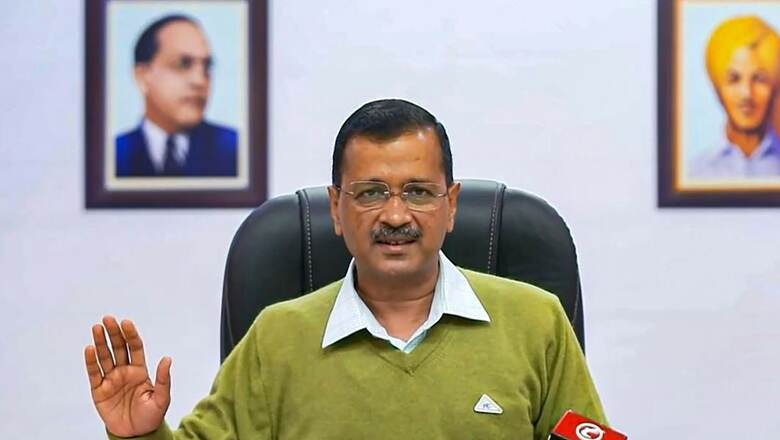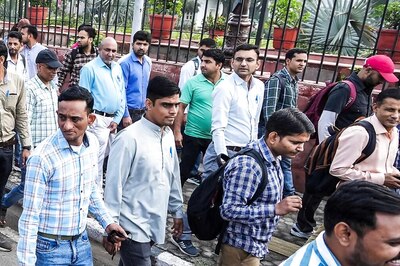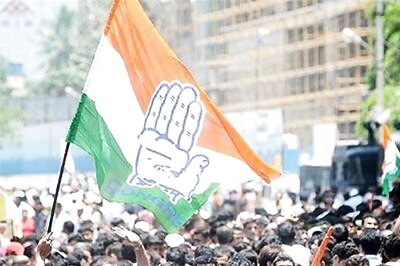
views
We had heard and known about governments-in-exile normally formed by ousted dictators or revolutionaries, but in what promises to be a first, Delhi faces the prospect of being ruled by a government from behind bars.
The Aam Aadmi Party (AAP), whose instinct for drama and bravado remains undiminished despite being in the grip of an existential crisis, announced with its usual flourish that if its supreme leader and Delhi chief minister, Arvind Kejriwal, is arrested in connection with the alleged liquor scam, he will not resign and continue to govern his “people” from jail.
Not only that; if necessary, the whole cabinet will move to Tihar lock, stock, and barrel in solidarity. All party MLAs reportedly unanimously decided that since the chief minister continued to enjoy the people’s mandate, he should continue to run the government from inside the jail in case, as widely speculated, he ends up there.
The party claims there is no legal bar on his continuing to act as CM while in custody until he is convicted.
“There is no provision in the Constitution that mandates the resignation of the chief minister if they are placed in jail for a trial,” his loyal lieutenant and cabinet minister Saurabh Bharadwaj told reporters.
Yet, to give it the appearance of public legitimacy, the party has announced a nationwide public referendum on the issue. Confusion and panic appear to have gripped the party at the prospect of the CM’s arrest. The truth is that what we are watching is its slow-motion demise with most of its top leadership caught up in alleged corruption cases and the party supremo himself now in the Enforcement Directorate’s crosshairs.
Many will find it puzzling how a party, which made a headline-grabbing debut barely a decade ago and was once hailed as a breath of fresh air and predicted to upend the old ways of doing politics, is now hovering on the brink of collapse.
It is a morality tale of betrayal and hubris: the party’s betrayal of its avowed fundamental principles and the arrogance of its leaders, principally Kejriwal.
It was not too long ago that AAP boasted of arguably the most diverse support base comprising middle-class professionals, Left-wing intellectuals, progressive academics, humble autorickshaw drivers and factory workers, Dalits, Muslims, slum-dwellers, and residents of gated communities.
The only other party which could once claim a similar feat was Congress in its heyday. It was the erstwhile Congress support base that shifted almost wholesale to AAP contributing to its dramatic rise. Ironically, the dial is now shifting in the other direction.
Typically, it has blamed the BJP for its troubles and while it is true that there has never been any love lost between the two, the fact is that it’s a victim of its own missteps. Although AAP has lurched from crisis to crisis ever since its inception in 2012, this time it looks more serious. And with a general election looming, its timing couldn’t have been worse for a party with such a highly centralised organisational structure and lacking a second line of credible leadership.
It’s an open secret that the AAP is a one-man show and if Kejriwal’s troubles mount further it would be left with a rump of rookies and chancers whose ability to hold it together is seriously in doubt. Kejriwal is his party’s only nationally recognisable public face and it doesn’t require special insight to imagine the potentially debilitating effect of his absence on the party. His control over all aspects of party affairs is so total that without him it is hard to think of anyone who could steer it through the crisis.
Party sources admit that the possibility of the Delhi CM’s arrest has prompted serious concern with no obvious senior functionary in sight who can take control of the party and the government, especially when the Lok Sabha elections—crucial for AAP’s expansion plans—are barely months away.
Even if Kejriwal continues to be around, he is likely to struggle to explain away the liquor case and undo the damage it has done to its image. Even as there is as yet no evidence of a smoking gun, there is simply too much smoke around to ignore it—especially after the Supreme Court ruling dismissing former deputy chief minister Manish Sisodia’s bail plea. It noted that there was evidence that “tentatively” supported the ED’s charge with regard to the “excess profit” of Rs 338 crore to distributors under the now-scrapped excise policy.
The Aam Aadmi Party’s future hangs by the slender hope that voters will be persuaded by its claim to be a victim of the BJP’s plot to “destroy” it because it sees AAP as a threat. Kejriwal’s last-minute decision to defy ED’s summons calling them “vague, motivated and unsustainable in law” and instead go off to Madhya Pradesh for electioneering appeared to be part of the party’s strategy to take the fight into the “enemy” camp.
In the coming weeks, the party faces a public test of this narrative. The fact that so many of its top leaders are facing corruption charges has led many of its supporters to question the party’s claim to be squeaky clean and different from other parties.
It is hard to escape a deep sense of betrayal among AAP’s supporters that a party born out of an anti-corruption movement and which came to power promising an honest and transparent system of governance should find itself so deeply embroiled in corruption cases.
The AAP leadership is already trying to manage expectations about the party’s performance in the coming assembly elections, pointing out that it is going into the campaign with its hands tied behind its back because of BJP’s “vendetta” politics.
As its Rajya Sabha member Raghav Chadha said in a statement on the ED’s summons to Kejriwal, “When a party’s top leadership is jailed, how will it fare well in elections?”
Meanwhile, irrespective of the cause(s) of the crisis, the question that is being asked is: is it finally, the end of the road for AAP in its present form in case the Delhi CM too ends up in jail?
But AAP’s obituary has been written many times before—only for it to bounce back after each crisis. And anecdotal evidence suggests that it still enjoys a fair degree of goodwill, particularly among working classes, a fact grudgingly acknowledged even by its critics.
Quite possibly, reports of AAP’s imminent demise may once again turn out to be exaggerated, but the blunt truth is that it is living on borrowed time and the clock is ticking away faster than Kejriwal might think.
The writer is an independent columnist and the author of ‘Unmasking Indian Secularism: Why We Need A New Hindu-Muslim Deal’. Views expressed in the above piece are personal and solely those of the author. They do not necessarily reflect News18’s views.



















Comments
0 comment